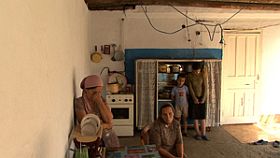


Documentary Pearls at Copenhagen Cinematheque

From the site: “The Cinematheque in the heart of Copenhagen offers a rich programme of more than 60 films every month, many of which are in English or with English subtitles. In October, we present roadmovies, East by Southeast, women’s lives in the Middle East, MIX Copenhagen Film Festival, Hollywood shorts, and much more.”
… and documentaries of high quality, indeed, which is the reason for this promotional text that also offers our readers to see what we previously have written about a couple of the films:
In the series “East by Southeast” you find Andrey Paounov’s “The Boy Who Was a King” about King Simeon, who in 2001 came back to Bulgaria to be elected prime minister. Paounov is an original film talent, which he has shown several times, among others with the wonderful “Mosquito Problems and other Stories”. Equally to be seen is Lithuanian “Barzakh” (photo) by Mantas Kvedaravicius about whom a colleague said to me: ”He is not a film director, he is a thinker”, who made the film over a period of years, now completing his PhD (and a book) on the affects of pain. And the film is about pain, about people in Chechnya, families whose members disappear or have undergone torture.
As the monthly documentary, the Cinematheque presents a gift to its audience. Seven screenings are set up of Viktor Kossakovsky’s “Vivan las Antipodas”, for this blogger maybe the most important and visionary documentary being published for years.
Finally, the “SønDok” (documentary on a Sunday including a debate with the
director, organised by EDN/European Documentary Network), the Dutch documentary “Gozaran – Time Passing”, which was described in the following way at idfa festival last year:
“In 2005, Iranian composer Nader Mashayekhi was asked to lead the Tehran Symphony Orchestra. He knew the weak position of Western classical and contemporary music in Iran would make this a difficult task. But he took on the challenge, and after having spent several years in Vienna studying, living and working, he returned to his country. As he puts it, “with only one suitcase containing only one thing: my dream to make music in my hometown.” Less than two years later he returned to Austria, his suitcase filled with the pieces of his broken dream. Filmmaker Frank Scheffer captures the passionate composer during rehearsals with young musicians in Tehran, wandering through a desolate desert landscape and a deserted village, looking for inspiration for new compositions and challenging performances, and then back in Vienna as he reflects upon his time in Iran. Political entanglements are only implicit in the film. The director chose for beautiful shots in a contemplative setting, in which Mashayekhi’s voice sounds like an internal monologue. He reflects on his life and debates the meaning of music and poetry, and his impossible yet unscathed love for his country.”
http://www.dfi.dk/Service/English/Filmhouse-activities/October-in-the-Cinemateque.aspx